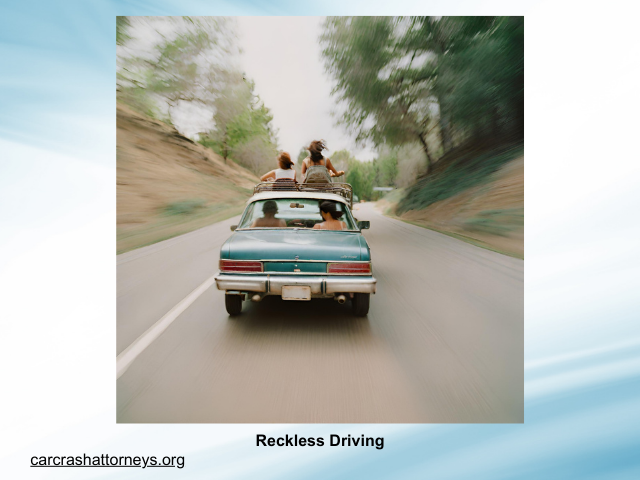What is Reckless Driving? An Overview of Laws & Penalties
Reckless driving is a grave issue that endangers not only the life of the driver but also the lives of innocent people on the road. With the potential for severe consequences, including criminal penalties and increased insurance premiums, understanding and preventing reckless driving is paramount. So, what exactly constitutes reckless driving, and how can one avoid it?
This blog post delves into the different aspects of reckless driving, including its definition, laws across various states, consequences, and ways to prevent it. By the end, the reader will have a comprehensive understanding of this perilous behavior and the necessary tools to steer clear of it.
Key Takeaways
Reckless driving involves willfully disregarding safety and engaging in dangerous activities on the road, resulting in criminal offenses with legal consequences.
Penalties for reckless driving vary by state, ranging from fines to license suspensions or jail time.
Driver education and safe driving techniques are essential for preventing reckless
Understanding Reckless Driving
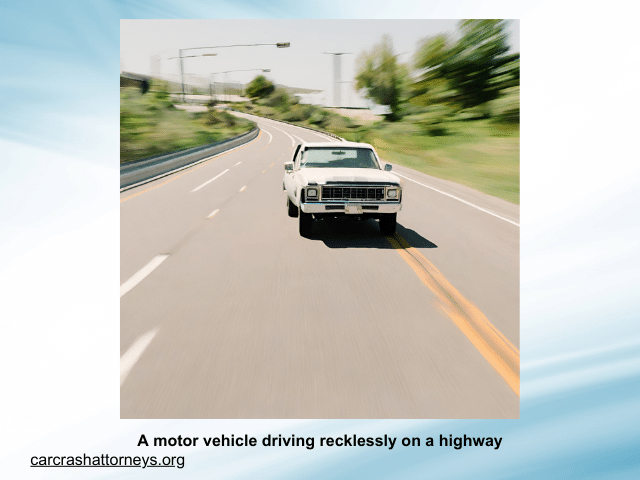
Reckless driving, as defined by law, involves the operation of a motor vehicle recklessly in a way that unreasonably interferes with the free and proper use of the public highway or unreasonably endangers users of the public highway. This hazardous behavior, often exhibited by reckless drivers, encompasses various dangerous activities such as excessive speeding, driving in the wrong direction, and even partaking in unauthorized speed contests. In more severe cases, aggravated reckless driving may also be considered. Keep in mind, a reckless driving conviction is considered a criminal offense, with potential repercussions such as fines, imprisonment, and driver’s license suspensions or revocations.
To fully understand reckless driving, one must recognize its two key components: willful or wanton disregard for safety and dangerous driving behavior. These elements, when combined, result in a perilous environment for all road users.
Willful or Wanton Disregard
Willful or wanton disregard refers to the intentional and conscious disregard for the safety of others while operating a motor vehicle. In Florida, for example, reckless driving laws necessitate that the driver’s actions are characterized as either willful or wanton. Speed, in conjunction with other factors demonstrating such disregard, is taken into account when examining reckless driving cases in the state.
Differentiating between willful misconduct and mere negligence is vital when considering reckless driving charges. For instance, in Berube v. State, the defendant’s actions did not amount to reckless driving. There was no evidence that he:
made an improper left turn
acted with conscious and intentional indifference to consequences
had knowledge that damage was likely to be done to persons or property.
Dangerous Driving Behavior
Dangerous driving behavior encompasses a wide range of activities that pose a significant risk to others on the road. Some of these behaviors include:
Speeding
Distracted driving
Driving under the influence
Aggressive driving
Traveling at a rate of 20 miles or more above the posted speed limit
Driving over 80 miles per hour on any road
Excessive speeding
Street racing
Sideshows
These behaviors are considered reckless driving and can have serious consequences. It is important to practice safe and responsible driving to ensure the safety of yourself and others on the road.
In Florida, it is illegal to convict someone of reckless driving based solely on evidence of excessive speed. Other proof is required for such a conviction. However, at least two appellate courts in the state have suggested that “grossly excessive” speeding may be sufficient for a conviction. The distinction between careless and reckless driving lies in the willful or wanton disregard for safety, as opposed to mere negligence or carelessness.
Reckless Driving Laws by State
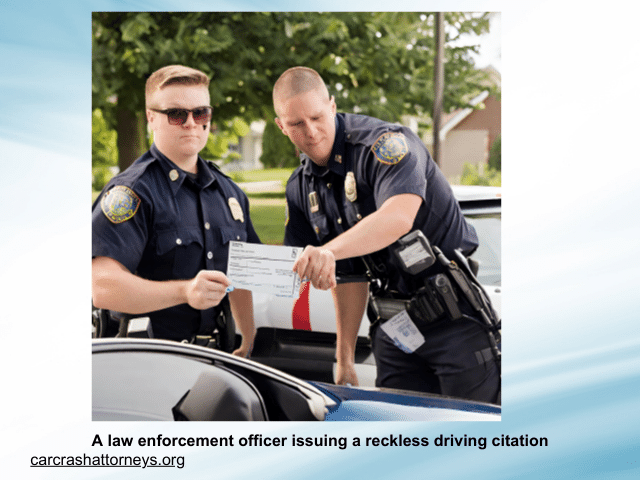
Reckless driving laws differ from state to state, with varying definitions and penalties depending on the jurisdiction. Here are some examples:
In California, reckless driving can result in a fine of up to $1,000, a six-month license suspension, and two points on your driver’s license.
In Utah, reckless driving is a class B misdemeanor, punishable by up to six months in jail and a fine of up to $1,000.
In Pennsylvania, reckless driving can lead to a jail sentence of up to 364 days, a fine of up to $5,000, and a 30-day driver’s license suspension.
Consulting the relevant state statutes for up-to-date and precise information on reckless driving laws and penalties is highly recommended.
For a more comprehensive understanding, we’ll examine the reckless driving laws and penalties in three states: California, New York, and Florida.
California
California’s reckless driving laws fall under the California Vehicle Code 23103, which defines reckless driving as operating a vehicle on a highway with willful or wanton disregard for the safety of persons or property. While the specific amendments made to California’s reckless driving laws in 1984 and 2001 have not been explicitly stated, it is essential to be aware of the legal consequences for reckless driving in the state.
These consequences can include incarceration for five to 90 days, a fine of $145 to $1,000, or a combination of both. Knowing the legal consequences for reckless driving in California can help drivers understand the severity of their actions and encourage them to abide by safe driving practices to avoid such penalties.
New York
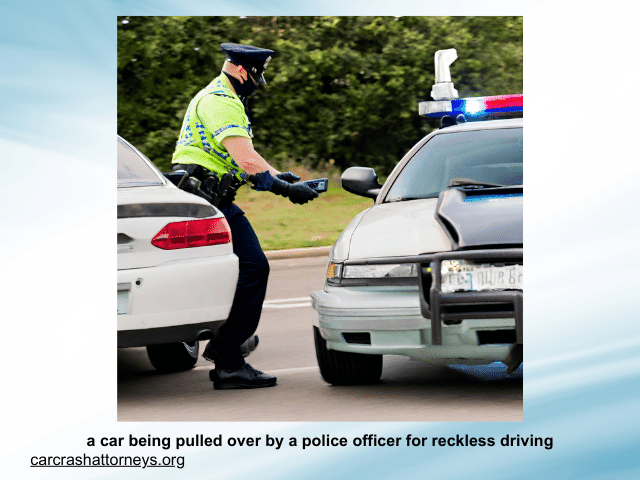
In New York, misdemeanor reckless driving is defined as operating a motor vehicle in a manner that demonstrates a willful or wanton disregard for the safety of persons or property. Reckless driving is considered a criminal misdemeanor in the state, with penalties that can include fines, potential incarceration, and probation. For a first offense, the fine ranges between $100 and $300, with the maximum penalty being 30 days in jail and a $300 fine.
Notably, New York permits a jury trial for all misdemeanors, offering an additional layer of protection for individuals facing reckless driving charges. Understanding the laws and penalties in New York can help drivers make informed decisions and avoid engaging in dangerous driving behaviors.
Florida
Reckless driving in Florida is defined under Section 316.192 of the Florida Statutes as operating a vehicle in a willful or wanton manner that disregards the safety of persons or property. The penalties for reckless driving in Florida vary depending on the severity of the offense and whether there was any property damage or personal injury incurred. Some exceptions to the reckless driving laws in Florida include emergency situations, where drivers may be exempt from these laws.
Preventing reckless driving in Florida requires drivers to:
Adhere to speed limits
Eliminate distractions
Stay aware of their surroundings
Always wear their seatbelt
Abstain from driving under the influence of drugs or alcohol.
Penalties for Reckless Driving
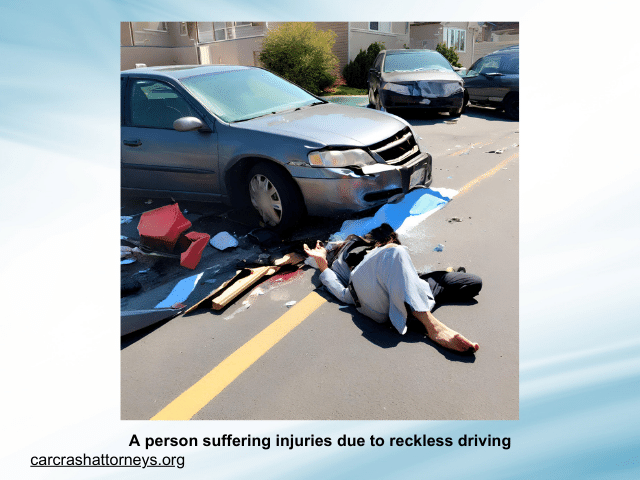
As mentioned earlier, the penalties for reckless driving can vary depending on the state and the circumstances of the offense. In general, these penalties can be grouped into three main categories: criminal penalties, driver’s license consequences, and insurance premium increases.
Comprehending the potential repercussions of reckless driving can guide drivers towards better decisions on the road, steering clear of hazardous behaviors. It is essential to note that the specific penalties for reckless driving can differ significantly from state to state, so drivers should familiarize themselves with the laws and consequences in their respective jurisdictions.
Criminal Penalties
Criminal penalties for reckless driving can range from monetary fines to incarceration, depending on the jurisdiction and severity of the offense. In some states, such as New York, a first-time reckless driving conviction can result in a fine between $100 and $300, probation, and a maximum penalty of 30 days in jail. In other states, like Virginia, reckless driving is classified as a Class 1 misdemeanor, which is a criminal offense punishable by up to one year of imprisonment.
It is important to remember that a reckless driving conviction is a criminal offense, which can have lasting consequences on an individual’s life, including difficulties in obtaining employment and housing, as well as potential restrictions on travel. A second or subsequent offense can lead to even more severe consequences.
Driver’s License Consequences
Driver’s license consequences of reckless driving can include:
Suspension or revocation, with the duration based on prior offenses and the severity of the incident
In California, a reckless driving conviction can result in a six-month license suspension
In New York, CDL drivers who are convicted of reckless driving for a second offense within three years can face a 60-day suspension, and a 120-day suspension for a third offense in three years.
It is crucial for drivers to understand the potential driver’s license consequences of reckless driving, as losing the ability to drive can significantly impact one’s personal and professional life. Being caught by a police officer or another law enforcement officer for such behavior can lead to these consequences.
Insurance Premium Increases
A reckless driving conviction can also lead to significant increases in insurance premiums. For example, a single violation can result in premium increases ranging from 19% to 115%, depending on the car insurance company. This increase can greatly affect not only auto insurance but also other types of insurance, such as home and life insurance.
It is essential for drivers to be aware of the potential insurance premium increases resulting from reckless driving, as these increases can have long-lasting financial consequences.
Careless Driving vs. Reckless Driving
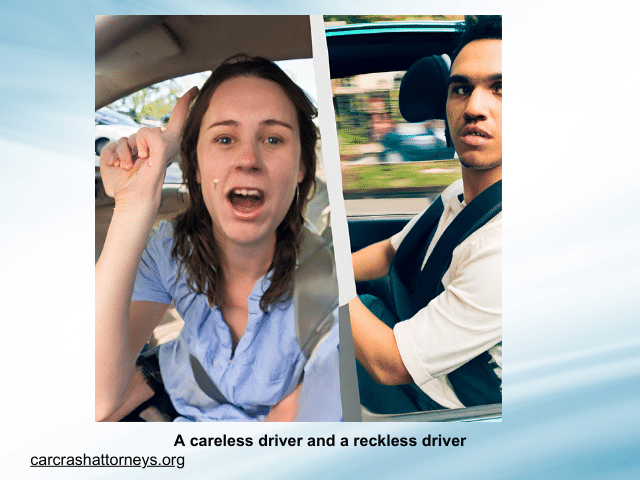
Although the terms careless driving and reckless driving are often used interchangeably, they have different legal distinctions and impacts on insurance rates. Careless driving generally involves a lack of attention or consideration, while reckless driving requires a willful or wanton disregard for the safety of others. Understanding the differences between these two terms can help drivers better comprehend the potential consequences of their actions on the road.
In the following sections, we will delve deeper into the legal distinctions between careless and reckless driving, as well as their respective impacts on insurance rates.
Legal Distinctions
The legal distinctions between careless and reckless driving involve the level of intent and potential harm to people or property. Reckless driving requires a willful or wanton disregard for the safety of others, as opposed to mere negligence or carelessness. In some states, like Florida, the evidence demonstrating only careless or negligent driving is not enough to support a reckless driving conviction.
By understanding the legal distinctions between careless and reckless driving, drivers can better recognize the severity of their actions and the potential consequences they may face if charged with either offense.
Impact on Insurance Rates
The difference between careless and reckless driving can affect insurance rates, with reckless driving typically resulting in higher premiums. Careless driving, on the other hand, can also lead to increased premiums but generally to a lesser extent than reckless driving. Insurance companies take both types of driving behaviors into account when evaluating an individual’s overall risk as a driver and determining their insurance rates.
Awareness of the impact of careless and reckless driving on insurance rates can help drivers make more informed decisions and avoid engaging in risky behaviors that can lead to increased costs.
Defending Against Reckless Driving Charges
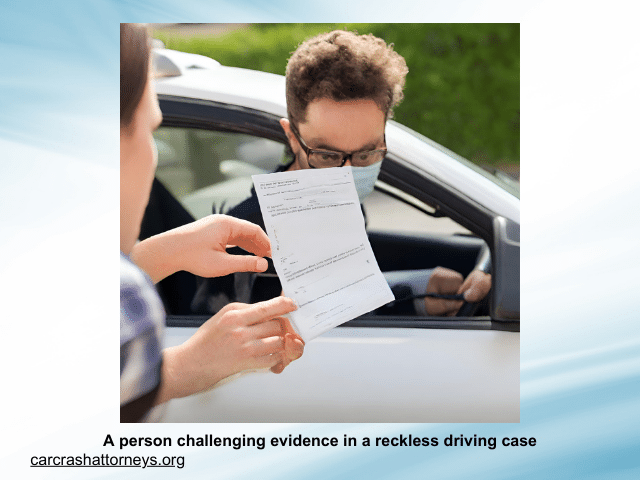
If faced with reckless driving charges, knowing your defense options against such allegations is crucial. Defending against reckless driving charges may involve challenging evidence or proving a lack of intent to harm. By understanding the various defense strategies available, you can better navigate the legal process and potentially reduce or dismiss the charges against you.
In the sections below, we will discuss the specific steps and strategies that can be employed to challenge evidence and prove a lack of intent in a reckless driving case.
Challenging Evidence
Challenging evidence in a reckless driving case can include disputing the accuracy of speed measurements or the reliability of witness testimony. For instance, the accuracy of speed measurements can vary depending on factors such as the accuracy of the speed measuring device, the distance from the vehicle, and the angle of the measurement.
Additionally, the reliability of witness testimony can be called into question due to factors such as the witness’s memory, ability to accurately observe the incident, and potential bias.
By challenging the evidence presented in a reckless driving case, you may be able to cast doubt on the prosecution’s case and potentially reduce or dismiss the charges against you.
Proving Lack of Intent
Proving a lack of intent to harm can help reduce or dismiss reckless driving charges, depending on the circumstances. To demonstrate a lack of intent, you may need to provide evidence that you were unaware of the risks associated with your actions, or that you took reasonable steps to avoid harm. In some cases, offering evidence of an emergency situation or demonstrating that you were not acting with malicious intent can be helpful in proving a lack of intent.
By proving a lack of intent to harm, you may be able to convince the court that your actions do not warrant a reckless driving charge, potentially leading to a reduction or dismissal of the charges against you.
Reckless Driving and Accident Liability
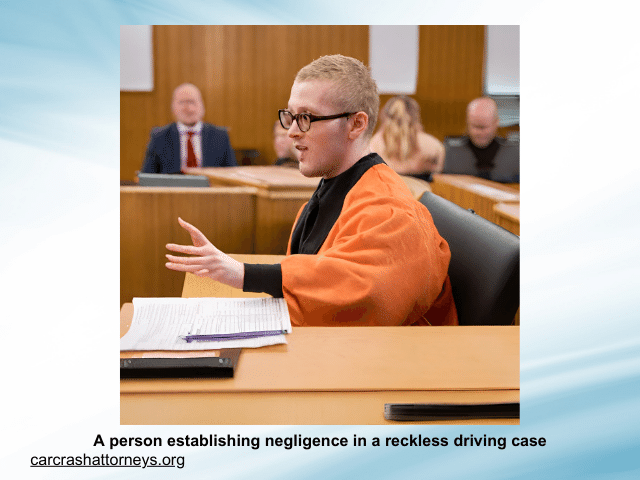
Reckless driving can have severe consequences not only for the driver but also for other road users who may be involved in an accident caused by such dangerous behavior. As a result, establishing negligence and pursuing compensation for damages caused by reckless driving are essential aspects of accident liability. Comprehending the process of establishing negligence and pursuing compensation enables accident victims to seek the necessary help for recovery from the physical, emotional, and financial damages inflicted by a reckless driver.
In the following sections, we will explore the steps involved in establishing negligence and pursuing compensation in reckless driving accidents.
Establishing Negligence
Establishing negligence in a reckless driving case can involve proving that the driver’s actions directly caused the accident and the resulting injuries. To demonstrate negligence, it is necessary to provide evidence that the driver did not show reasonable care and disregarded the safety of others on the road.
Additionally, evidence from the scene, such as photographs of the damage to vehicles and the extent of the impact, can be used to reconstruct the accident and demonstrate negligence. By establishing negligence, accident victims can hold the reckless driver accountable for their actions and seek compensation for the damages they have incurred, including serious bodily injury.
Pursuing Compensation
Pursuing compensation for damages caused by reckless driving may include filing a claim with the at-fault driver’s insurance company or pursuing a personal injury lawsuit. To file a claim with the driver’s insurance company, you must provide them with the necessary information, such as the date and time of the accident, the names of the parties involved, and any other relevant details.
If you decide to pursue a personal injury lawsuit, you will need to file a complaint in court and provide evidence to support your claim. It is recommended to hire an attorney to represent you in court and help guide you through the legal process.
By pursuing compensation, accident victims can recover the costs of medical expenses, lost wages, property damage, and other losses resulting from the reckless driver’s actions.
Preventing Reckless Driving

Prevention of reckless driving is vital to guarantee the safety of all road users. By investing in driver education and practicing safe driving techniques, drivers can significantly reduce the risk of engaging in reckless behavior on the road. By becoming more aware of the potential dangers of reckless driving and the appropriate measures to avoid such behavior, drivers can contribute to a safer driving environment for everyone.
In the following sections, we will discuss the importance of driver education and the various safe driving techniques that can help prevent reckless driving.
Driver Education
Driver education plays a vital role in raising awareness of the dangers of reckless driving and teaching individuals how to avoid engaging in risky behaviors. Driver education can be provided through various formats, such as:
Classes
Online courses
Videos
Simulations
Hands-on driving experiences
By participating in driver education programs, drivers can learn about the importance of driving safely and responsibly, as well as the potential consequences of reckless driving. Investing in driver education is a crucial step towards preventing reckless driving and ensuring that drivers are well-equipped with the knowledge and skills necessary to navigate the road safely.
Safe Driving Techniques
Safe driving techniques include:
Maintaining a safe following distance
Avoiding distractions
Adhering to the speed limit
Using turn signals
Remaining aware of surroundings
By following these techniques, drivers can help prevent reckless driving and reduce the risk of accidents, creating a safer driving environment for all road users.
By practicing these safe driving techniques, drivers can significantly decrease the likelihood of engaging in reckless behavior on the road. Incorporating safe driving techniques into daily driving habits is an essential step towards preventing reckless driving and promoting a safer driving environment for everyone.
Summary
Reckless driving is a serious issue that poses a significant threat to the safety of all road users. By understanding the various aspects of reckless driving, including its definition, laws across different states, consequences, and prevention measures, drivers can make more informed decisions and avoid engaging in dangerous behaviors on the road.
In conclusion, it is crucial for drivers to invest in driver education and practice safe driving techniques to prevent reckless driving and ensure a safer driving environment for all. By becoming more aware of the potential dangers of reckless driving and taking the appropriate measures to avoid such behavior, drivers can contribute to a safer driving environment for everyone on the road.
Frequently Asked Questions
What is reckless driving in FL?
Reckless driving in Florida is defined as any person who drives a vehicle with willful or wanton disregard for the safety of persons or property. This is a second-degree misdemeanor, and can carry a punishment of up to 90 days imprisonment, 6 months probation and/or a fine of up to $500.
What do you mean by reckless driving?
Reckless driving is the careless, wilful and dangerous disregard for the rights of others on the road, often resulting in accidents or property damage. It usually involves a high speed, and careless disregard for safety.
Is reckless driving a criminal offense in Wisconsin?
Yes, in Wisconsin reckless driving is considered a criminal offense. The state defines it as operating a vehicle in a careless or negligent manner, which endangers the safety of others.
What is the most common punishment for reckless driving?
Reckless driving is usually punished with hefty fines and possible jail time, ranging from a few hundred to several thousand dollars and up to one year in prison. Some states may also assess points on traffic violation point systems for this conviction.
How can I defend against reckless driving charges?
To defend against reckless driving charges, challenge any evidence or prove that no intent to harm existed.
Legal Disclaimer: The content provided on carcrashattorneys.org is for general informational purposes only. It is not intended as legal advice, nor does it constitute an attorney-client relationship. The information may not be accurate, complete, or updated when viewing. Carcrashattorneys.org and its authors disclaim all liability for any actions taken or not taken based on the content of this site. Always consult with a licensed attorney in your jurisdiction before making any legal decisions. This website may contain links to other websites. We are not responsible for the content, accuracy, or opinions expressed in such websites, and such websites are not investigated, monitored, or checked for accuracy or completeness by us.

